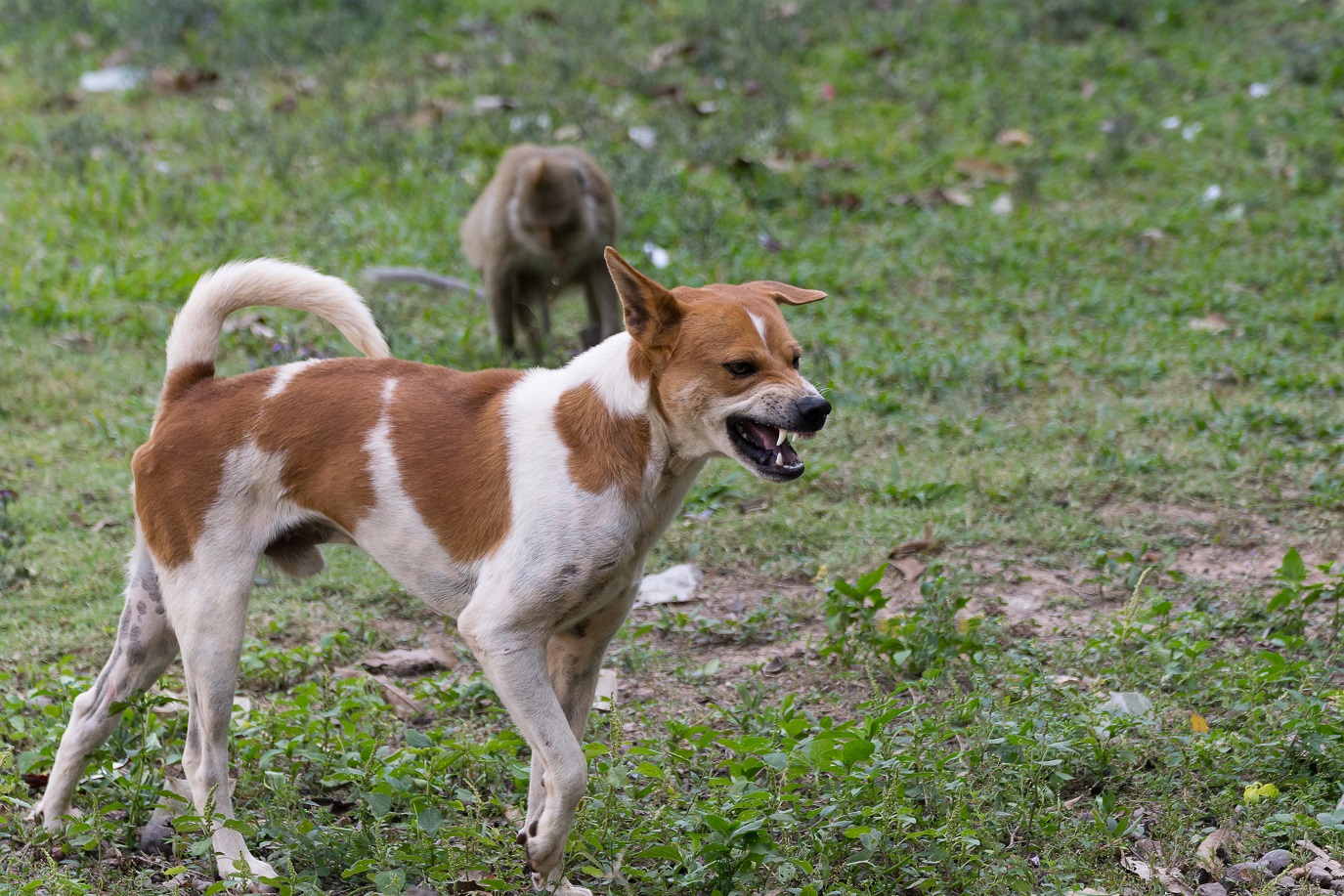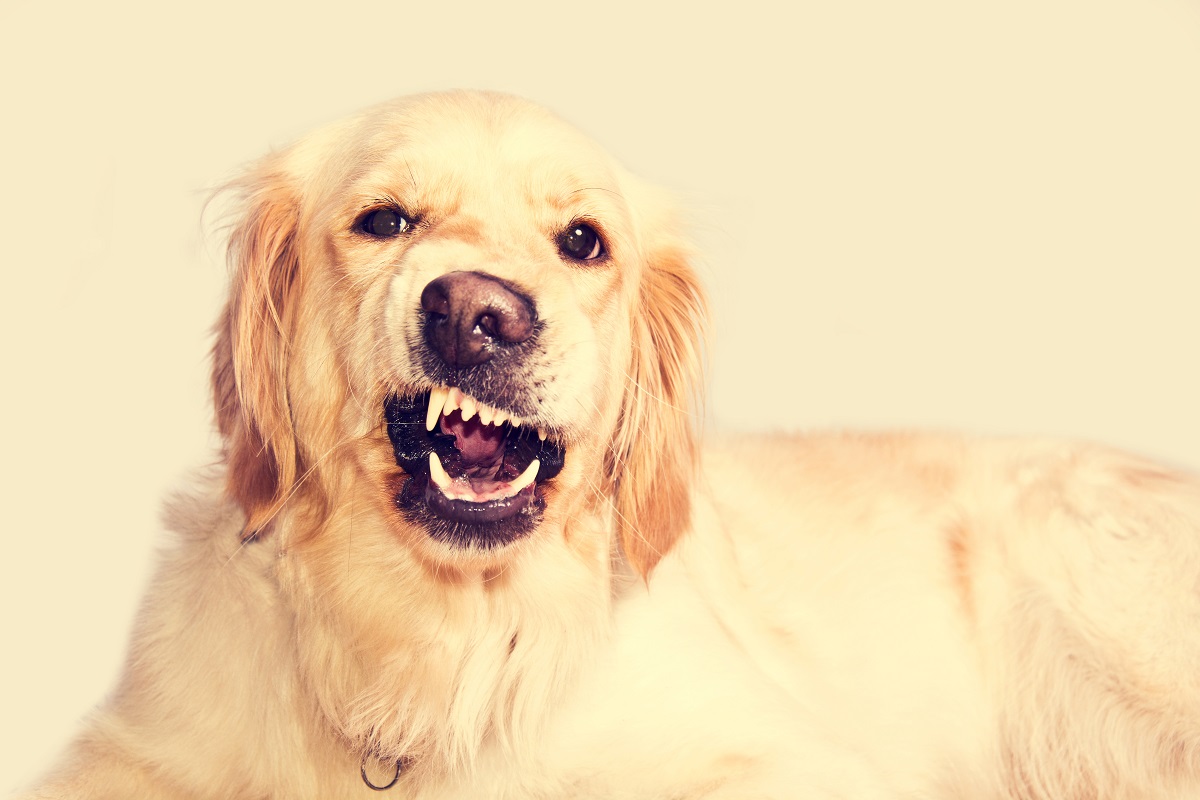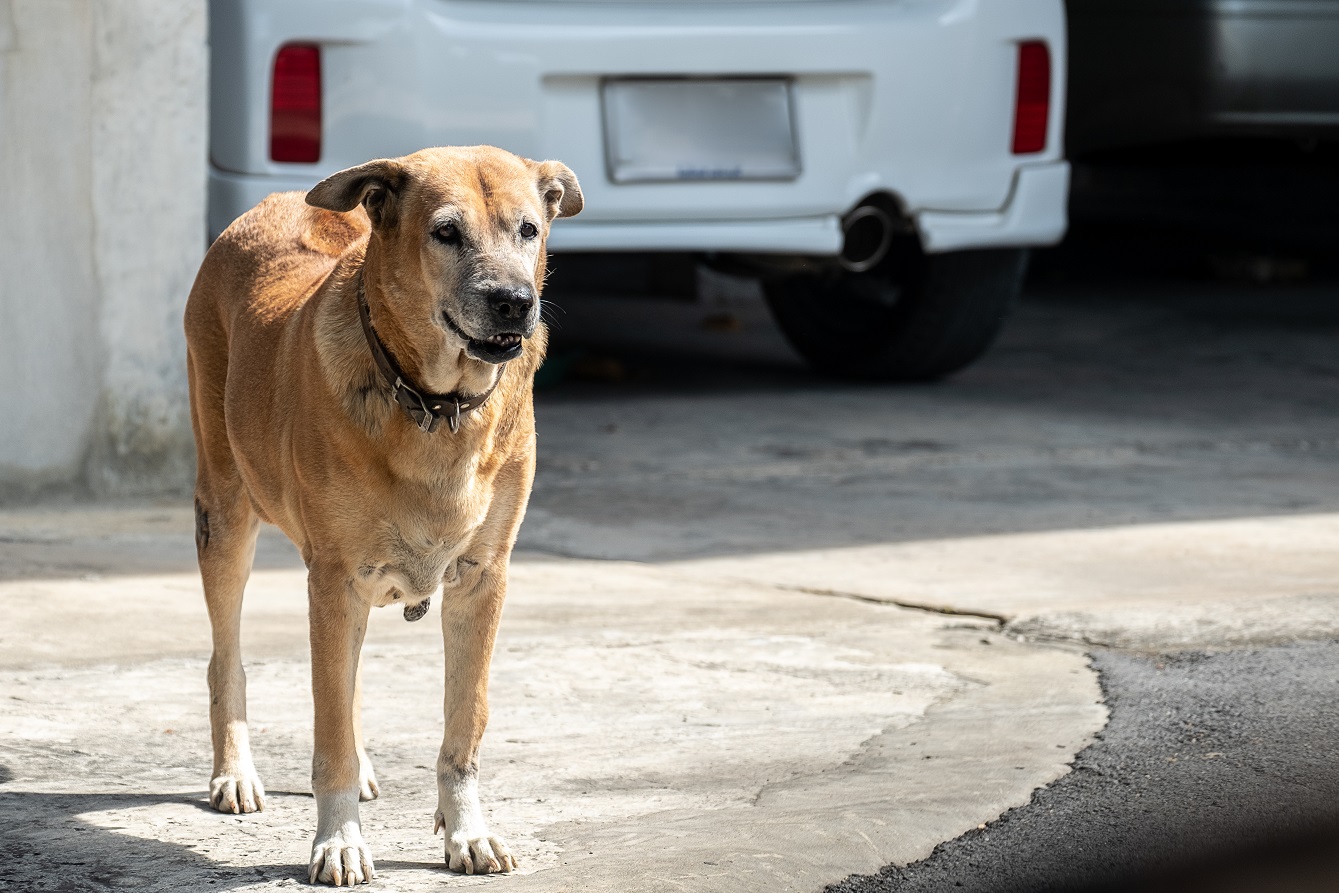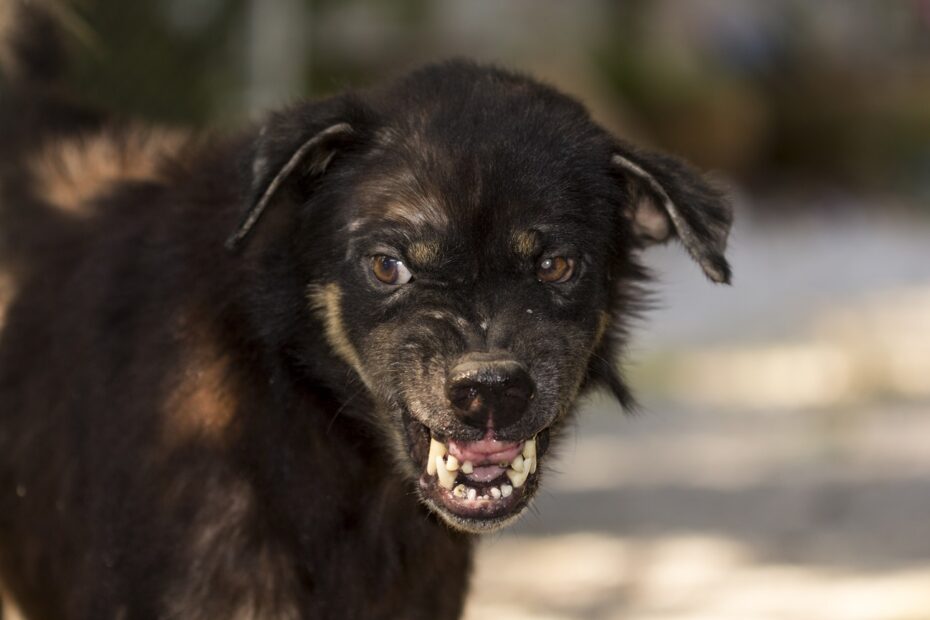Why is my dog growling at me all of a sudden?… If you’re asking yourself this question, then trust me, you’re not the only one.
Just like barking, dogs growl as a way of communicating. So the idea that you need to stop your dog growling completely isn’t the point of this post.
The idea, however, is to limit unwanted growling. The type of growl that can put others in danger without any prior warning on your dog’s part.
Now, just to give you a little insight, there are a few common reasons dogs growl.
Sometimes it’s to let you know they’re happy…
…Other times, it’s to warn you to back off.
…And in worst cases, it’s a clear sign that they’re about to attack.
But here’s the thing, even though growling can be considered dangerous, menacing, and downright scary. It’s by no means impossible to tame the beast within and manage your dog’s growling effectively with the right plan of action.
The first step? …figure out why it’s happening.
The second step? …teach your dog a little emotional control.
See, if you can figure out why your dog is growling in the first place, you’ll be much better equipped to put certain measures in place to limit potential growling fits in the future.
Pair this the second step (teaching your dogs how to dial down their emotions). And you’ve got the ultimate recipe for nipping your dog’s growling in the bud before it becomes a real problem.
This is why before you do anything else, I’d highly recommend checking out the Dog Calming Code from Dan Abdelnoor over at The Online Dog Trainer. (see video below)
Now, just watching a video alone isn’t really going to do you any favors in stopping your dog’s growling. But during the video, Dan not only demonstrates why emotional control is the key to solving your dog’s growling. But he also reveals a few simple, highly effective calming techniques to bring it under control with just minutes a day of training.
So watch the video, implement the training Dan recommends, and you should see a huge reduction in your dog’s unwanted growling a lot sooner than you think.
Anyway, here’s the link to take a look: Click Here To Discover How To Finally Solve Your Dogs Frustrating, Dangerous Growling Problem Using A Few Simple Calming Techniques That Take Just Minutes A Day To Implement!
(video will open in a new window)
Why Is My Dog Growling At Me All Of A Sudden?
Dogs growl for many reasons, but it can be alarming if they begin growling at you all of a sudden, particularly if they’re normally so calm and relaxed in your company. Know that your dog is trying to tell you something with a growl.
It’s up to you to try and work out what they’re trying to say and manage their behavior so it doesn’t get out of hand. As lots of dog owners will be aware, growling often results in aggressive behavior, so it’s important to deal with it as best you can.
Here are some reasons why your dog might be growling at you.
Territorial instincts
A dog that growls at the postman, delivery person, or any other person that they believe to be an ‘outsider’ may be growling to defend their territory from intruders. This is often a positive thing for dog owners to see, as you want your dog to defend your home!
However, if your dog growls at you or another family member because they believe you to be encroaching on their personal space, it’s not something to be pleased about.
You might find that your dog has decided that a particular part of the sofa or a corner of your bedroom is theirs and theirs only. A low growl as you approach is their way of telling you to back off and leave them in peace.
Possessiveness
Similar to defending their territory, dogs growl at their owners when they’re establishing possession over a certain item. This could be a toy they love to play with, or maybe even an item that they have absolutely no right to show possession over, like your socks or the kitchen towel.
It can be tricky coaxing your dog to drop an item they believe to be rightfully theirs, and their initial growl can turn into a snarl or snap if they think you’re going to take it away from them.
You need to be particularly careful about a dog’s possessiveness around young kids, as they can often lash out if they think your child is about to take something away from them.
Related Post: How To Calm An Aggressive Dog – Simple Tips For Aggressive Behavior

Warning
Some dogs growl to warn you about something, and it goes hand in hand with the two points already raised. If you’re on their territory or threatening to take away an item they believe to be theirs, they’ll growl as a warning to back off.
They also might be warning you about external stimuli or something that they can all of a sudden smell. This might be the neighbor’s cat entering your garden or someone approaching your front door.
Remember, dogs growl to communicate with their owners, so they might be trying to warn you about an impending threat to get you to do something about it.
Dominance
You will find that some breeds of dog growl to assert their dominance. This might be dominance over another family pet, or they might even be trying to dominate you as their owner.
If you notice your dog growling around mealtimes or when you’re about to take them on a walk, it may be a sign that they’re trying to assert some authority over the situation and influence your behavior in a certain way.
Fear
The world can be a scary place for dogs. Whether it’s fireworks, thunderstorms, or loud traffic from the road outside your home. Your dog might be growling to let you know that they’re scared of something that’s happening outside of your home.
Equally, if your dog growls at you or another person, they might be scared of what you’re about to do. You might be approaching your dog in a different way, or they might be responding badly to your body language or the fact that you recently raised your voice.
Most dogs growl when they’re scared or anxious, so if you find your pup growling at you all of a sudden, they may well be scared of something that they fear happening.
(video will open in a new window)
Different Types Of Growl
As you can see, there are many reasons why your dog might be growling. Some of these are perfectly natural responses to external stimuli, or there may be some deep-rooted behavioral issues that you might need to tackle to prevent your dog from becoming aggressive.
So, how do you differentiate between playful and aggressive growling?
You can tell a lot from your dog’s body language and the sounds your dog makes when they growl. For instance, if your dog is aggressive, their growl will likely be characterized by stiff posture, bared teeth, and a low, throaty sound.
The fur on their backs will also be upright, and you will find that their tale is most likely between their legs.
Light-hearted growling, on the other hand, is often distinguished by the fact that your dog is playing and is showing no signs of discomfort. They are likely to be wagging their tail and bounding around, so it should be obvious if their growl is part of their play routine.
While you don’t need to worry if your dog’s growls are reserved for playtime, you do need to think about taking action if your dog’s growl could lead to aggressive behavior.
Granted, it’s not easy to stop your dog from growling, but there are certain things you can do to try and calm them down and change their behavior.
Related Post: Why Does My Dog Growl At Me At Night? – 5 Reasons Your Dog Growls

How To Stop Your Dog Growling
As we’ve explored, growling is part of a dog’s natural instincts, so you won’t be able to completely eradicate it from your pup’s personality. That being said, you can take action to stop your dog from growling aggressively for the reasons we’ve already explored. Let’s look at some things you can try at home.
Establish the root cause
As is the case with any challenging behavior, you need to begin by trying to establish the root cause of your dog’s growling. Ask yourself the following questions:
- Does my dog growl at a particular time of the day or in response to specific events?
- Is there a particular area of the house that your dog’s growling is worse than it is elsewhere?
- Are there any noises that lead to your growling?
- Does your dog growl when you’re alone or when you’re with other people or dogs?
- Is there a discernible difference in your dog’s body language before the growling begins?
Asking yourself these simple questions will help you establish the root cause of the growling. If, for example, you notice that your dog only growls at you when you’re with your partner, you can set about socializing your dog.
This will encourage them to be more sociable and accepting of outsiders, which is an important learning curve for all young dogs.
Remove any triggers that cause the growling
Elaborating on the example just given, you need to remove any triggers you think could cause your dog’s growling.
What do we mean by triggers?
Well, your dog’s triggers depend on the reason they’re growling.
Taking away a toy they believe to be theirs when they’re not playing with it, or moving their bed to a new location in the house, could be viable ways of dealing with possessiveness and territorial aggression, respectively.
In short, when you think you’ve understood the root cause of your dog’s growling, you will then be able to ascertain the triggers and take the necessary action to try and prevent your dog from growling in those situations.
This process requires a fair bit of trial and error. But you will definitely see success if you pay attention to your dog’s body language and behavioral cues.
Teach them emotional control
Teaching your dog emotional control isn’t something that happens overnight, but it’s a vitally important part of their development. After all, territorial aggression and possessiveness are significant behavioral problems that need to be adjusted.
Before employing the services of a trained dog behaviouralist, you might want to check out this video from the Online Dog Trainer, where he talks in-depth about how to better understand your dog’s emotions and introduces you to a number of techniques to stop your dog’s persistent growling.
If you find yourself struggling to control your dog’s aggression and growling, it’s important to seek advice from a professional and undertake some training. Never get angry or show frustration to your dog when they’re growling, as this will only make the situation worse.

Wrapping Things Up
If your usually calm and happy dog begins growling at you for seemingly no reason, it can be extremely worrying and down heartening.
That being said, getting to the root cause of the behavior and looking for ways of reducing your dog’s triggers could make a huge difference and help to change your dog’s behavior.
However, with time, patience, and consistency, you will be able to rectify the problem sooner rather than later.

